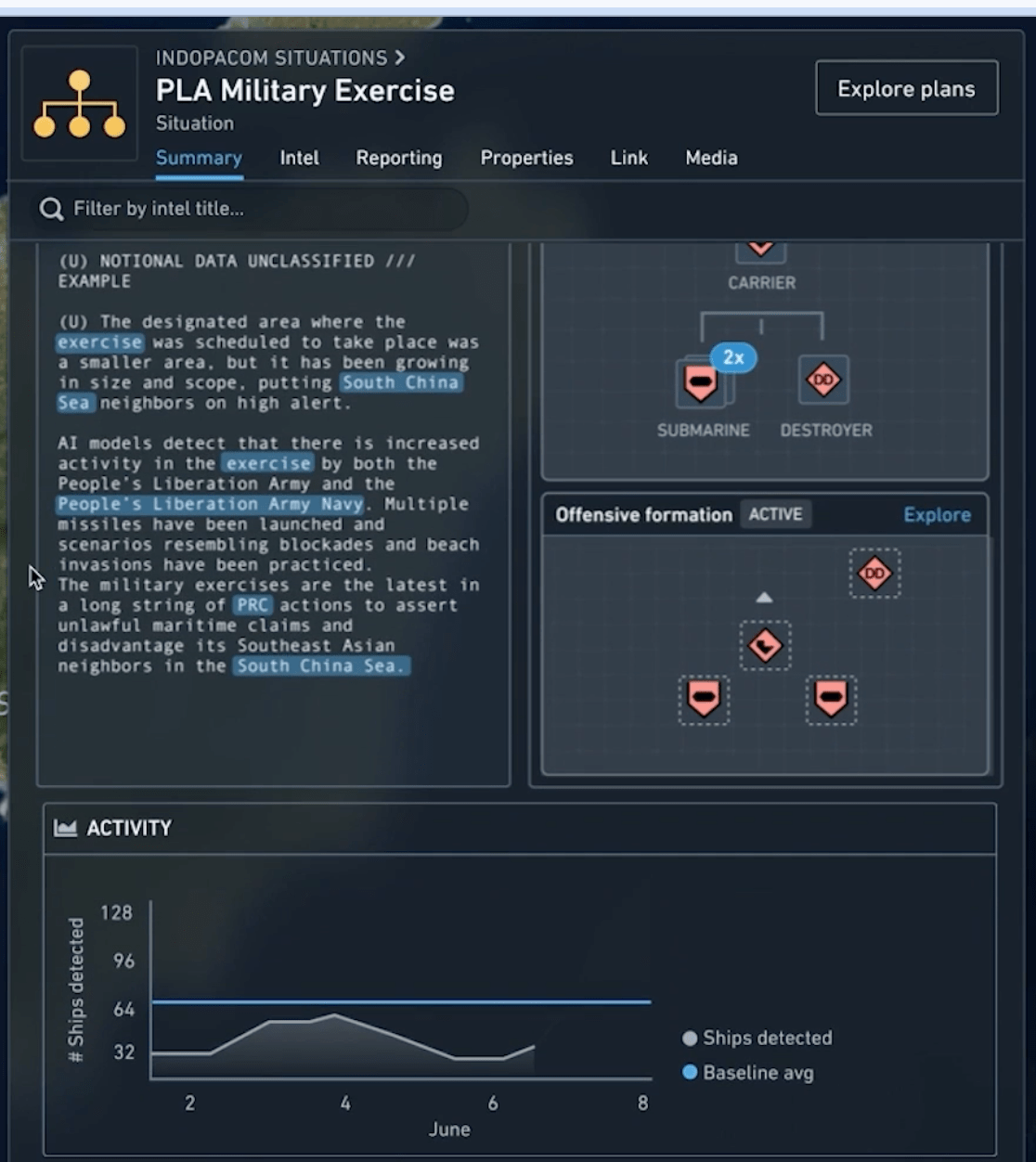The Impact Of Palantir's New NATO Deal On Public Sector AI

Table of Contents
Enhanced Data Integration and Analysis Capabilities for NATO
Palantir's Foundry platform, the core technology at the heart of this deal, offers NATO unprecedented capabilities for integrating and analyzing massive datasets from diverse sources. This includes intelligence reports, sensor data, communications intercepts, and more. The implications are transformative:
- Improved intelligence gathering and threat assessment: By correlating data points across disparate systems, Palantir's platform enables NATO to identify patterns and predict threats with greater accuracy, significantly enhancing its situational awareness. This improved intelligence gathering directly contributes to more effective national security strategies.
- Streamlined decision-making processes through data-driven insights: The platform provides decision-makers with readily accessible, visually intuitive presentations of complex data, enabling faster and more informed responses to evolving security challenges. This streamlined approach improves the efficiency of NATO's operations and its ability to respond to emerging threats.
- Enhanced cybersecurity capabilities: Palantir's technology can assist in identifying and mitigating cyber threats, protecting NATO's critical infrastructure and sensitive information from malicious actors. Improved cybersecurity is crucial for maintaining the integrity and resilience of the organization's operations.
- Improved interoperability between NATO member nations: The platform facilitates seamless data sharing and collaboration between member nations, breaking down information silos and improving overall operational effectiveness. This enhanced interoperability is a critical step toward building a more unified and responsive alliance.
However, the enhanced data integration capabilities must be carefully balanced against data privacy and security concerns. Implementing robust security protocols and adhering to strict data governance frameworks are vital to ensuring responsible use of this powerful technology within the NATO context. The ethical implications of handling sensitive data at this scale cannot be underestimated.
Increased Adoption of AI in Public Sector Defence and Security
The Palantir-NATO deal serves as a powerful catalyst for increased adoption of AI within other public sector organizations focused on defence and security. The demonstrated success of the technology within a high-stakes environment like NATO will encourage other governments to explore similar applications. Potential uses include:
- Potential applications in homeland security (border control, crime prevention): AI-powered systems can analyze vast amounts of data to identify potential security threats, improving border control efficiency and helping prevent criminal activity.
- Emergency response and disaster management improvements via AI-driven predictive modelling: AI algorithms can analyze historical data and real-time information to predict and prepare for emergencies, allowing for faster and more effective response mechanisms.
- Increased efficiency in government operations through automation and data analysis: AI can automate many routine tasks, freeing up human resources for more complex and strategic work. Data analysis can help government agencies identify areas for improved efficiency and resource allocation.
While the benefits of increased AI adoption are undeniable, it is crucial to acknowledge potential drawbacks. These include concerns about job displacement, algorithmic bias, and the potential for misuse of powerful AI tools. Careful planning and consideration of the societal impact are essential to ensure that AI deployment benefits all citizens fairly and safely.
Ethical and Societal Implications of Palantir's Technology in Public Sector AI
The use of Palantir's technology in the public sector raises significant ethical and societal concerns. These concerns center around issues of algorithmic bias, transparency, and accountability.
- Discussion of algorithmic transparency and accountability: It is crucial to ensure that AI algorithms used in public sector applications are transparent and accountable, so that their decision-making processes can be understood and scrutinized. A lack of transparency can lead to unfair or discriminatory outcomes.
- Potential for human rights violations if not properly managed: If AI systems are not carefully designed and monitored, they could potentially lead to human rights violations, particularly in areas such as law enforcement and surveillance.
- The need for robust ethical guidelines and regulatory frameworks for AI in the public sector: The development and implementation of robust ethical guidelines and regulatory frameworks is essential to ensure responsible use of AI in the public sector and mitigate potential harms. International collaboration is needed to establish standards for AI governance.
The increasing reliance on private companies like Palantir to shape Public Sector AI raises further questions about the balance of power and potential conflicts of interest. Open discussion and careful consideration of these ethical dilemmas are essential for the responsible deployment of AI in government.
The Future of Public Sector AI: Lessons from the Palantir-NATO Deal
The Palantir-NATO partnership offers valuable lessons for the future of Public Sector AI adoption globally. The deal highlights the transformative potential of AI in enhancing national security and improving public services, but also underscores the importance of ethical considerations and robust regulatory frameworks.
- Predictions about the pace and scale of AI adoption in public service: The deal suggests an accelerated pace of AI adoption in public service, with a focus on national security and defence.
- The impact on public sector employment and workforce training: AI adoption may lead to changes in job roles and increased need for workforce training in data science, AI ethics, and related fields.
- Potential shifts in geopolitical power dynamics due to AI advancements: The development and deployment of AI technology have the potential to shift geopolitical power dynamics, particularly if some nations are significantly ahead of others in their capabilities.
Moving forward, collaboration between public and private sectors is crucial for developing responsible and effective AI solutions for the public good. This requires a commitment to transparency, accountability, and ethical considerations at every stage of the process. Open dialogue and the sharing of best practices are key to ensuring that Public Sector AI benefits all of society.
Conclusion: The Enduring Impact of Palantir on Public Sector AI
Palantir's deal with NATO will have a lasting impact on the trajectory of Public Sector AI. The enhanced data analysis capabilities, increased AI adoption, and ethical considerations discussed above will reshape how governments approach national security, public services, and data management. The responsible implementation of AI technology in the public sector is not simply a technical challenge, but a societal imperative. Ethical considerations must remain paramount. We must prioritize transparency, accountability, and the prevention of potential harms.
Stay informed about the evolving landscape of Public Sector AI and its transformative potential. Continue your research and engage in the critical conversations surrounding this rapidly developing field.

Featured Posts
-
 Renaissance Et Modem Elisabeth Borne Precise Sa Strategie De Fusion
May 09, 2025
Renaissance Et Modem Elisabeth Borne Precise Sa Strategie De Fusion
May 09, 2025 -
 Zaderzhki Reysov V Aeroportu Permi Posledstviya Snegopada
May 09, 2025
Zaderzhki Reysov V Aeroportu Permi Posledstviya Snegopada
May 09, 2025 -
 Zelenskiy Tramp V Vatikane Makron Oglasil Itogi Vstrechi
May 09, 2025
Zelenskiy Tramp V Vatikane Makron Oglasil Itogi Vstrechi
May 09, 2025 -
 Liga Chempionov 2024 2025 Prognoz Na Polufinaly I Final Raspisanie I Tv Translyatsii
May 09, 2025
Liga Chempionov 2024 2025 Prognoz Na Polufinaly I Final Raspisanie I Tv Translyatsii
May 09, 2025 -
 174 Billion Lost How Trumps Tariffs Impacted Top Billionaires
May 09, 2025
174 Billion Lost How Trumps Tariffs Impacted Top Billionaires
May 09, 2025
